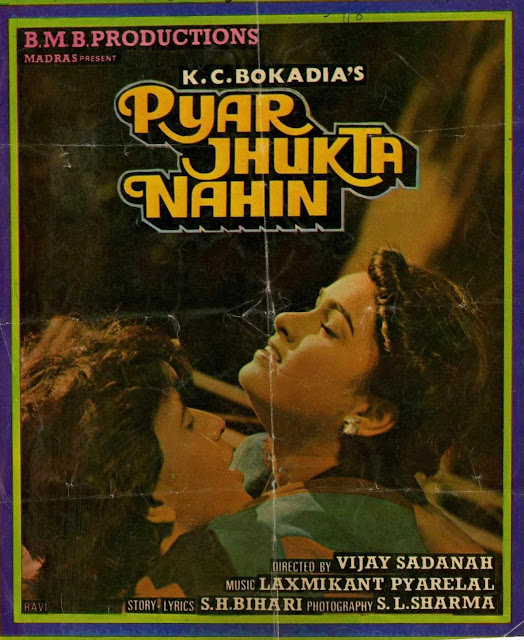Starcast :- Mithun Chakraborty, Padmini Kolhapure, Danny Denzongpa, Bindu, Madhu Malini and Master Vicky Direction :- Vijay Sadanah Musi...
Starcast :- Mithun Chakraborty, Padmini Kolhapure, Danny Denzongpa, Bindu, Madhu Malini and Master Vicky
Direction :- Vijay Sadanah
Music :- Laxmikant Pyarelal
"Pyaar Jhukta Nahin" stormed Bollywood in January 1985,
becoming a phenomenal box-office success and solidifying Mithun Chakraborty's
superstar status. Directed by Vijay Sadanah, the film was a remake of the
immensely popular Pakistani film "Aina" (1977), starring Nadeem and
Shabnam. "Aina" in turn had been inspired by the 1973 Shashi Kapoor-Sharmila Tagore starrer "Aa Gale Lag Jaa". While the core emotional narrative remained intact, "Pyaar Jhukta
Nahin" injected a distinctly Bollywood flavor, with heightened melodrama,
vibrant musical sequences, and a focus on the romantic leads' chemistry. It
became a cultural phenomenon, resonating with audiences through its themes of
love, separation, and social disparity.
Storyline: The narrative centers around Ajay (Mithun
Chakraborty), a struggling but talented photographer, and Preeti (Padmini
Kolhapure), a wealthy heiress. They fall deeply in love, but their relationship
faces insurmountable obstacles due to their starkly different social
backgrounds. Preeti's family, particularly her arrogant father, Vijay (Danny
Denzongpa), vehemently opposes their union, believing that Ajay is merely after
their wealth. The film portrays the couple's unwavering commitment to each
other, their struggles against societal pressures, and the sacrifices they make
for their love. The emotional crux of the story lies in the question of whether
love can truly conquer all, even in the face of rigid social structures and
familial opposition.
Direction and Other Technical Departments: Vijay Sadanah's
direction effectively captured the emotional intensity of the story. While it
was a remake, he managed to infuse it with a fresh energy and a distinct '80s Bollywood aesthetic. The film's pacing was well-maintained, balancing emotional
scenes with musical interludes. The cinematography, though not groundbreaking,
served the narrative adequately, highlighting the lead actors' expressions and
the film's dramatic moments. The editing was standard for its time, ensuring a
smooth flow of the story. The set designs and costumes reflected the era and
the characters' social standing effectively.
Performances: Mithun Chakraborty delivered a powerful
performance as Ajay, showcasing his versatility as an actor. He portrayed the
character's vulnerability, determination, and unwavering love convincingly.
Padmini Kolhapure, known for her expressive eyes and nuanced performances,
perfectly embodied Preeti's innocence, strength, and emotional turmoil. Their
on-screen chemistry was palpable, contributing significantly to the film's
success. Danny Denzongpa, as the antagonist, played his role with the required
intensity, adding a layer of conflict to the narrative. Other supporting actors
provided solid performances, contributing to the film's overall impact.
Music: The music of "Pyaar Jhukta Nahin" was a
major highlight, contributing significantly to its popularity. Composed by
Laxmikant-Pyarelal, the soundtrack featured memorable melodies and heartfelt
lyrics. Songs like "Tumse milkar na jaane kyun," "Chahe lakh
toofan aaye," and "Tumhe apna saathi banane se pehle" became
anthems of romance and resonated with audiences across generations. The
playback singing by Lata Mangeshkar, Shabbir Kumar, and Kavita Krishnamurthy was
exceptional, adding emotional depth to the songs. The music effectively
amplified the film's emotional moments and contributes to its enduring appeal.
"Pyaar Jhukta Nahin" was a quintessential '80s
Bollywood romantic drama that struck a chord with audiences due to its
emotional storyline, compelling performances, and memorable music. While it was
a remake of "Aina," it successfully adapted the story for a Bollywood
audience, creating a distinct identity of its own. The film's exploration of
love, sacrifice, and social disparity continues to resonate with viewers,
making it a timeless classic. It cemented Mithun Chakraborty's position as a
leading star and solidified the chemistry between him and Padmini Kolhapure.
The film's enduring popularity, even 40 years later, is a testament to its ability to capture the
essence of romantic melodrama and deliver a satisfying emotional experience.
By Ayushman Mitra











No comments